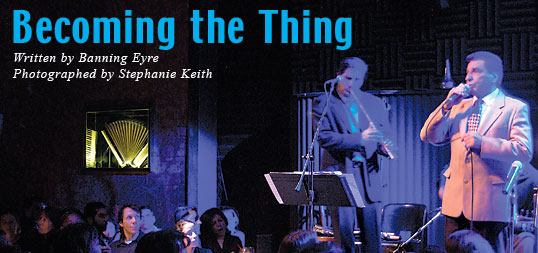 |
 |
| Bassam Saba (left) and Youseff Kassab perform at Joe’s Pub in Manhattan. |


Dawn Elder exclaims, juggling two cell phones and an armful of promotional materials in a basement corridor of the New York Hilton. On a frigid Monday in January, the 47th annual convention of the Association of Performing Arts Presenters (APAP) has brought together some 4000 US-based planners and producers of music, theater and dance events. Amid dozens of panel discussions and several hundred exhibits, the centerpiece of the conference’s first special focus on Arab culture features Elder’s panel on Arab arts and culture. But as the first speakers finish their remarks, the musicians are nowhere in sight.
Tunisian vocalist Amina Annabi had been up on the 42nd floor rehearsing with Lebanese-American maestro Ali Jihad Racy—but not any more. Jivan Gasparyan, master of the Armenian duduk flute, had been asleep after his overseas flight—but no longer. Mercan Dede, leader of a genre-crossing Turkish trance-pop ensemble, is not answering his cell phone—or his urgent voice mails. “Just glitches,” says Elder, checking for more messages. “This is show business. We’re opening a new world. It’s not always easy.”
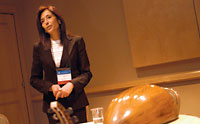 |
 |
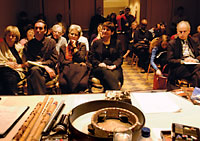 |
 |
| Top: Dawn Elder, president of Dawn Elder Management and World Entertainment, hosted panel discussions January 10 and 12 to introduce artists whose names (and whose instruments, above) are often household words in the Middle East, but who remain largely unknown in the US. |
 |
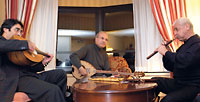 |
 |
| Simon Shaheen, Ali Jihad Racy and Jivan Gasparyan practice in Elder’s hotel suite. |
Her confidence is rewarded when the musicians, errant no longer, take seats at a table before the audience of some 200 theater managers, booking agents and critics. A folksy exchange of stories ensues, bridging experiences in the Middle East, North Africa, Canada, France, Armenia, Turkey and the United States. It’s an anecdotal tour of joys and frustrations along the world-music road in times that, for all their trouble, are the most promising in years.
“I think our very presence here is an accomplishment,” says Ismael Ahmed, executive director of the Dearborn-based Arab Community Center for Economic and Social Services (ACCESS). With Elder and apap president and ceo Sandra Gibson, he is a key organizer of the conference’s Arab focus. “APAP is the biggest gathering of arts presenters in the country. Trends are set here.”
Since the late 1990’s, world music aficionados within apap had noticed that, while recordings of Arab music were making dramatic inroads in the us, concert tours by Arab artists—so crucial to building an enduring genre audience—were either rare or invisible outside urban Arab-American communities. “There really was a glass ceiling for presenting Arab music,” says Ahmed, whose own background includes years of radio work as well as concert presentation. Now, he says, “we’ve punched a hole in it, and it’s getting bigger. For me, this is a home run. It’s not the game, but we got our first run.”
Elder notes with irony that after September 11 many Arab-American presenters got cold feet “just at the moment when a broader audience was becoming curious.” Main-stream presenters wanted to respond, claims Elder, but they were intimidated more by the complexities of touring untried international groups than by the uncertain political climate. International acts are always expensive, and to be successful, she says, you need to know both how to reach urban ethnic communities and how to draw a general American audience to pay to hear a show they may know little or nothing about.
 Elder and Gibson first grappled with all of that back in 1998 when they organized the International Friendship Festival in Long Beach, California. It presented world-class Arab musicians, including Lebanese vocal stars Sabah and Rabih al Khaouli, and Palestinian ‘ud and violin virtuoso Simon Shaheen, to more than 100,000 listeners. Now, five years later, “we wanted to push that awareness to a new level, but also to stress that this is achievable,” she says.
Elder and Gibson first grappled with all of that back in 1998 when they organized the International Friendship Festival in Long Beach, California. It presented world-class Arab musicians, including Lebanese vocal stars Sabah and Rabih al Khaouli, and Palestinian ‘ud and violin virtuoso Simon Shaheen, to more than 100,000 listeners. Now, five years later, “we wanted to push that awareness to a new level, but also to stress that this is achievable,” she says.
Others echo that sentiment. Leigh Ann Hahn, director of Grand Performances, a series of free outdoor events in Los Angeles, says that Arab music is “the thing now. There’s a buzz; 9/11 sent a chill, but it also lit a fire…. The opportunity is huge, and if we don’t use it in the right way we are missing a great moment.”
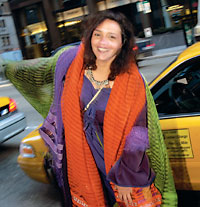 |
 |
| Tunisian singer-songwriter Amina Annabi brought her increasingly popular, classical-to-rap vocal range to New York. |
Many at the conference credited Elder, who now manages many of the Arab artists touring in North America, for a catalytic role. “Dawn is a hole digger,” says Hahn. “She decided early on to bring artists and art to a world that hadn’t yet realized it needed them.
She did that because it’s her heritage. And to be doing that as a woman in such a male-dominated world is pretty remarkable. She has courage that borders on insanity.” Some presenters did seem daunted, though. Could you present an Arab concert in a church and not offend anyone? Do the audiences for popular and classical Arab artists overlap? Is it all just too political? And what about getting us visas for artists from Middle Eastern countries?
Woeful tales about artists’ visas abounded. Artist manager Eva Skalla, who scrapped a tour by the Iranian Kurdish ensemble The Kamkars, called current us visa difficulties “a major chill factor.” Mitchell Greenhill of Folklore Productions, who books tours for Sudanese-born star Hamza El Din, is hoping to book an ensemble tour from Pakistan later this year. But he isn’t sure. “Even people with the best of intentions are daunted,” he says. “We’re a small office. How many resources can we devote to bringing 11 Pakistanis in?”
 Brian Goldstein, who is among the most sought-after lawyers in the country when it comes to getting visas for foreign artists, told the conference that the process is “frustrating, gut-wrenching, expensive and difficult—but doable.” There is no moratorium on Middle Eastern artists, he says. “Everybody is in the same boat.”
Brian Goldstein, who is among the most sought-after lawyers in the country when it comes to getting visas for foreign artists, told the conference that the process is “frustrating, gut-wrenching, expensive and difficult—but doable.” There is no moratorium on Middle Eastern artists, he says. “Everybody is in the same boat.”
Vexing as they can be, the visa issues often obscure a still greater obstacle to Arab-music tours: high artists’ fees. Maure Aronson of World Music, Boston’s premier presenter of international music and dance performances, says that to present shows that will appeal “to all the communities of greater Boston, ticket prices must be reasonable, $40 at most. The price quotes I get [from major Arab performers] would require me to charge $100, and I’m not prepared to do that.” Hahn echoed this, noting that although recent performances by Iraqi superstar Kazem al Saher impressed her, “I can’t afford to present him.”
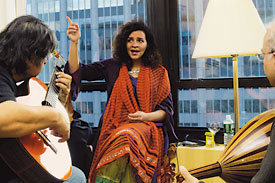 |
 |
| Amina rehearses with flamenco guitarist Arturo Martinez and Ali Jihad Racy. |
This is logistics, Elder says, not greed. Over the years, bookers of world music acts have persuaded large African and Brazilian bands to pare down their lineups in order to make touring in the us financially feasible. Elder says many of her artists have yet to figure out how to do this. “They feel they need to bring a minimum of 10 musicians, up to as many as 36, because Arab music involves so many different instruments,” she says. “You need a big string section, a powerful percussion section and a chorus. The artists feel it takes numbers to capture the essence of their music.” In addition, travel costs from the Middle East and North Africa make tours legitimately expensive.
Elder has persuaded some artists to draw upon the wealth of talented U.S.-based Arab musicians, but established artists are often hesitant. She argues it this way, she says: The ultimate goal is not simply concerts, but a career in the world’s largest music market. “This is the concept I have the hardest time getting across to the artists,” she says.
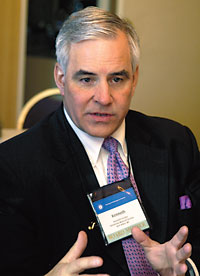 |
 |
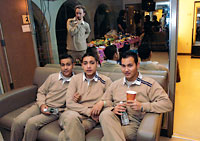 |
 |
| Top: Ken Fischer has led the University of Michigan’s decade-long effort to forge musical alliances with Detroit-area communities including access, which hosts the three-day annual Concert of Colors, Detroit’s largest outdoor festival. “Our staff had grown up seeing this monolithic Arab community, but we weren’t taking the time to get to know it,” he says. Above: Born in Turkey but now based in Montreal, Mercan Dede, above, in mirror, waits with three of his teenage band members before their GlobalFest performance. |
 |
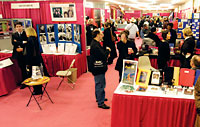 |
 |
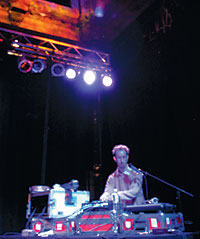 |
 |
| Top: The Association of Performing Arts Presenters (APAP) annual convention is the largest assembly in the US of agents, promoters, venue representatives and artists. Above: Mercan Dede mixes traditional Turkish rhythms and instruments with electronica at GlobalFest. |
Elder believes there’s an opportunity here for Arab-world governments and cultural institutions. “In other countries—Japan, even France—there are grants from tourist and culture ministries to underwrite tour costs,” she explains. “Just as we’re educating here, people on the artists’ sides too have to understand that there is a need.”
For their part, American audiences are hard-pressed to comprehend the Arab-world stature of artists like Sabah Fakhri, Wadi al Safi or Kazem al Saher. Household names abroad, they are hard even to pronounce for Americans. At a summer festival last year in Amman, Hahn says, “I saw people diving through the crowd hoping just to snap Kazem’s picture through the window of his limousine.” Jeff Peters, a former tour manager for the Beach Boys, was doing al Saher’s sound for the same show: “I hadn’t seen anything like that crowd energy since the Beach Boys played a free concert on the Washington Mall.”
For the live-performance highlights of the conference’s Arab-music focus, attenders tasted direct musical power at GlobalFest, a sold-out, five-hour, three-stage extravaganza at the city’s Public Theatre. Michael Orlove, program director for Chicago’s Department of Cultural Affairs, says it was “the hottest ticket in town.” Among 16 world-music acts, visiting presenters could experience Marcel Khalife’s fusion of Arab classical music and jazz and Mercan Dede’s power-marriage of traditional Turkish and DJ beats. Two nights later, violin virtuoso Simon Shaheen hosted and performed a tour de force showcase at Joe’s Pub, including an improvisation with Jivan Gasparyan, Ali Jihad Racy’s collaboration with Amina, a piece Shaheen composed for ‘ud and string quartet, as well as sets by Shaheen’s classical Near East Music Ensemble and his experimental fusion group, Qantara.
“I’m looking at the business cards I collected and the people who signed my lists, and there are lots who are not part of the world-music crowd,” says Elder. “I think we’ve started to open the door.”
The artists, of course, have their own take on the experience of touring in America. What advice would they give fellow Arab-world artists? Hamza El Din encourages them to “make the sacrifice” of putting up with visa hassles, arduous air travel and reduced gate revenues. Shaheen warns that the process of playing small clubs can be humiliating if you are accustomed to metropolitan theaters and stadium shows back home. Amina offers practical advice: “I would give them Dawn Elder’s e-mail address and phone number!”
In the end, everyone present seemed motivated more by prospects than hurdles. As Anan Ameri put it, “The [US] government is making it harder,” he says, while “the people are much more interested. I really think they want to learn more about Arab music and culture. The arts community is progressive.”
After 22 years working to introduce Arab music in his adopted country, New York-based Shaheen has long since made peace with this apparent contradiction. “Americans are really great,” he says. “They can absorb a lot. They want to reach out…. The contradictions go both ways. Arab musicians should come and play. If you have been doing your art with integrity and vision, you have to keep on. You cannot let a circumstance cancel your vision and cancel your past.”
 |
Banning Eyre is a free-lance writer specializing in African music and co-producer of “Afropop Worldwide,” distributed by Public Radio International. He can be reached at banning@afropop.org. |
 |
Stephanie Keith (www.stephaniekeith.com) is a New York free-lance photographer whose work has also appeared in The New York Times and U.S. News & World Report. |
|
|